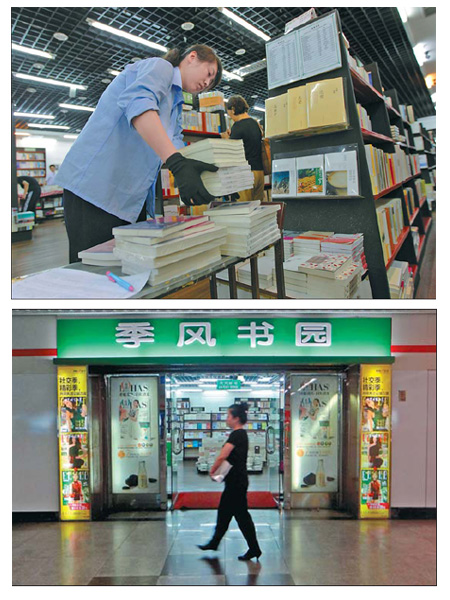Books
From bookstores to museums
Updated: 2011-08-16 08:05
By Zhang Kun (China Daily)
|
Top: The rise in rents, employee salaries and pensions have become a burden for Jifeng bookstores in Shanghai. Gao Erqiang / China Daily Above: A Jifeng bookstore at Shanghai subway's Shaanxi Road station. Gao Erqiang / China Daily |
At the end of July, Jifeng closed its branch bookstore at Raffles City, a mega shopping mall on People's Square in the heart of downtown Shanghai.
That left just four Jifeng Bookstores in Shanghai, half as many as there used to be.
"All possible ways of trying to keep the shop open have been tried," says Yan Bofei, president and general manager of Jifeng Bookstore. "All the other shops around Jifeng (in Raffles City) pay five times the rent."
The rise in rents, employee salaries and pensions have become a burden for Jifeng, threatening its survival, Yan says.
At the same time, revenues have dropped as more people turn to digital reading, and online bookstores sell at more competitive prices.
Yan feels that if the trend continues, all of Jifeng's stores may have to close down in four to five years.
For more than 10 years, Jifeng has been a landmark on Shanghai's cultural scene. The 800-square-meter flagship store at Shaanxi Nanlu Metro Station is a meeting place for book lovers, locale for book launch events and the first name mentioned when talking about independent bookstores in Shanghai.
"Jifeng is a store for real book lovers - unlike Shanghai Book Mall, where you'll drown in millions of junk books," says Feng Tao, a devoted reader and book editor based in Shanghai. "The layout of Jifeng shows its attitude. The latest publications of serious literature, philosophy and social studies are given the most prominence. All the books are arranged scientifically and systematically. You can always easily find what you are interested in."
Additionally, Jifeng hosts lectures, reading clubs and various book-themed activities. A Jifeng newsletter comes out monthly about its latest books and events.
And most importantly, Jifeng has a publishing workshop producing 50 to 60 tomes a year. They are mostly academic books on social studies and philosophy. Like the bookstore, the publishing workshop is the brainchild of Yan.
A former researcher of philosophy at the Shanghai Academy of Social Sciences, Yan, 57, quit his job in the 1990s to take charge of the bookstore.
"It was not my primary goal to make profit," he says. "I aimed at a career of culture and enlightenment and thought commercial gains would arrive naturally - now it seems that's not the way things happen."
"The events are popular with readers, but they haven't helped much with sales," Yan says. "The publishing projects are not immediately profitable either."
Yan says other private bookstores are in a similar situation. New bookshops emerge every year in Shanghai, most of them tiny and selling beverages and design products as well.
"Idealistic young people keep coming up to open their own little bookstores. It's nice to see them having the dream," Yan says, adding it's sad to see them close soon after.
Traditional bookshops are losing readers to digital reading on mobile phones, tablet PCs and other Internet-based reading devices. "Even I have to admit that it is convenient and pleasant to read on an iPad," Yan says.
While the Internet is an endless resource for Chinese books, the country's online stores, such as Dangdang, Amazon and the new player in the industry, 360buy, are constantly competing to offer the lowest prices.
The disadvantage of online shopping - delayed delivery - has been solved by Kuaishubao (which means "fast book bag"). It promises delivery of your book within the hour, free of charge.
Meanwhile, the online platform at kongfz.com has brought together hundreds of old bookshops all over China, selling rare and out-of-print books.
The State-owned Xinhua Bookstores also face the same challenge from online bookstores and digital publications, but is protected because of its nationalized status.
"We don't get the kind of resources and advantageous policies Xinhua has from the government," Yan says.
About five years ago, Yan called for legal limits on book discounts to protect the publishing industry, but China's cultural authorities did not respond.
"Sometimes I dream that a tycoon will invest 1 or 2 million yuan ($156,400-$312,800) and that will be enough for us to carry on for another year. By the time digital reading takes over completely, an actual bookstore will be a rarity in a city, like a museum. At that time books printed on paper will be treasured as a legacy of the past," Yan adds.
China Daily

Specials

Star journalist leaves legacy
Li Xing, China Daily's assistant editor-in-chief and veteran columnist, died of a cerebral hemorrhage on Aug 7 in Washington DC, US.

Robots seen as employer-friendly
Robots are not new to industrial manufacturing. They have been in use since the 1960s.

Smurfs up in China
The movie remake of a classic 1980s cartoon series is expected to have special cross-generation appeal to Chinese filmgoers
